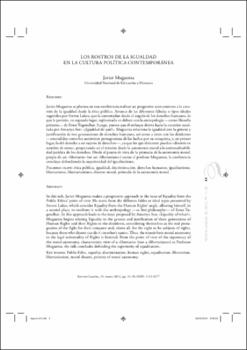Los rostros de la igualdad en la cultura política contemporánea
Date
2012Abstract
Javier Muguerza se plantea en esta conferencia realizar un progresivo acercamiento a la cuestión de la igualdad desde la ética pública. Arranca de las diferentes fábulas o tipos ideales sugeridos por Steven Lukes, que la contemplan desde el ángulo de los derechos humanos, lo que le permite, en segundo lugar, replantearla en debate con la antropología como filosofía primera de Ernst Tugendhat. Luego, puesto que el enfoque deriva hacia la cuestión suscitada por Amartya Sen: ¿Igualdad de qué?, Muguerza relaciona la igualdad con la génesis y justificación de tres generaciones de derechos humanos, así como a éstos con los disidentes entendidos como los auténticos protagonistas de las luchas por su conquista, y, en primer lugar, la del derecho a ser sujetos de derechos, ya que los que disienten pueden «disentir en nombre de otros», propiciando así el tránsito desde la autonomía moral a la universalizabilidad jurídica de los derechos. Desde el punto de vista de la primacía de la autonomía moral, propia de un «libertario» (no un «libertariano») como el profesor Muguerza, la conferencia concluye defendiendo la superioridad del igualitarismo. In this talk, Javier Muguerza makes a progressive approach to the issue of Equality from the Public Ethics’ point of view. He starts from the different fables or ideal types presented by Steven Lukes, which consider Equality from the Human Rights’ angle, allowing himself, in a second place, to confront it with the anthropology as first philosophy of Ernst Tugendhat. As this approach leads to the issue proposed by Amartya Sen: Equality of what?, Muguerza begins relating Equality to the genesis and justification of three generations of Human Rights and then Rights to the dissidents, considering themselves as the real protagonists of the fight for their conquest and, above all, for the right to be subjects of rights, because those who dissent can do it «in other’s name». Thus, the transit from moral autonomy to the legal universality of Rights is fostered. From the point of view of the supremacy of the moral autonomy, characteristic view of a «libertario» (not a «libertariano») as Professor Muguerza, the talk concludes defending the superiority of equalitarism.





